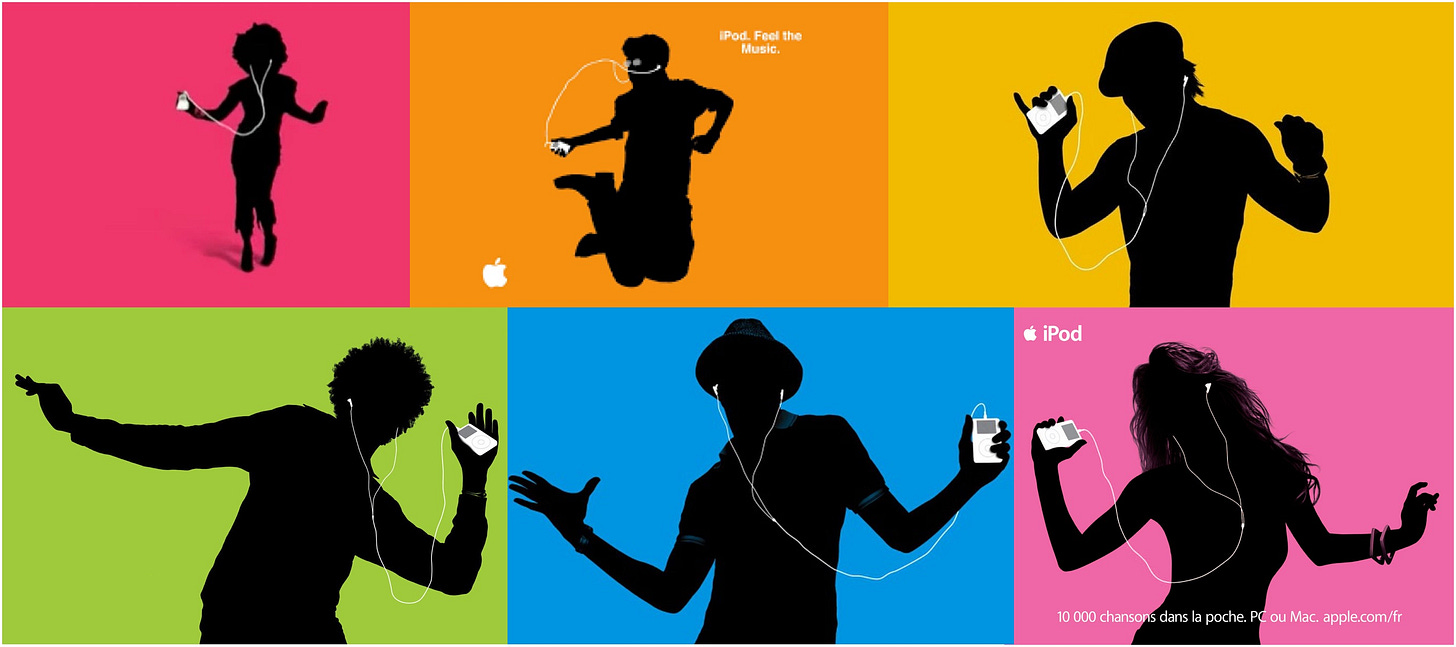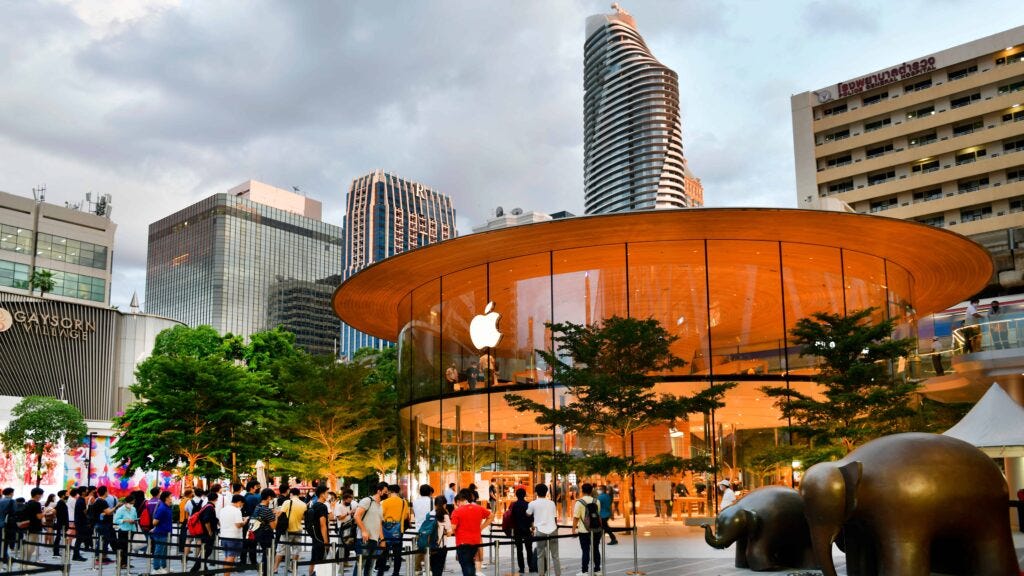🍏 The Magic of... Apple
What is the marketing psychology behind Apple's success and what surprising path is the premium technology brand taking around sustainability?
Hi 👋 I’m Florian Schleicher. This is the FutureStrategies newsletter. Thank you so much for reading along 💚
Apple was the most valuable brand in the world in 2023.
Its value increased by 55%.
Ever since the iPod was introduced, I, like many others, have been a brand disciple, and all my work equipment consists only of Apple products.
Are their products that much better than the competition? I don't know, but they represent more to me than simply technical devices.
Apple is a phone, a watch, a laptop, a tablet, but also a streaming service, a self-proclaimed protector of digital privacy and a lifestyle.
💭 Think Different
Simon Sinek sums it up quite well:
While most technology companies communicate
“We make great computers. They are beautifully designed, simple to use and user-friendly. Wanna buy one?”
Apple takes a different approach and has a more special brand identity.
The communicate:
“Everything we do, we believe in challenging the status quo. We believe in thinking differently. The way we challenge the status quo is by making our products beautifully designed, simple to use and user-friendly. And we happen to make computers. Wanna buy one?”
In the vast world of technology, where most devices aim to be faster and cheaper, Apple rises above it all as a beacon of design and functionality. Their brand story goes beyond the boundaries of simple devices; it's a journey of mystique, personality, and irresistible fascination.
At the heart of Apple's approach for years was the visionary Steve Jobs, whose indomitable spirit and pursuit of perfection shaped the company's ethos.
I too will never forget his appearances, as here at the launch of the iPhone in 2007:
🪄 Was is the magic of Apple?
For Apple, it was never just about making products.
It's about creating an unparalleled physical experience that began the moment a customer held the new device in her hands. From the carefully designed packaging to the iconic "click" sound when opening a MacBook, every aspect was meticulously designed to evoke a sense of awe and anticipation.
Most technology companies focused on specs and numbers, but Apple knew the real magic was in the intangible connection a user would make with their device.
Their strategy revolved around individualism, symbolized by the "i" in their products. In Apple's world, each user was celebrated as a unique person, and their devices were designed to seamlessly become the extension of their personality.
In their marketing communications, Apple did not present groups of people who used their products; instead, they wanted each individual to feel that an Apple product was made exclusively for them.
Apple has been living this individualism in marketing and communications for decades.
The magic of their world-famous "Think Different" campaign resonated in the call to question the status quo and embrace one's own uniqueness.
To swim against the tide, to be different, or as in the commercial - “Here is to the crazy ones” in which they borrowed from world-famous misfits and masterminds.
And that's still evident today when we take a look at Apple's associations:
And as is the case with good marketing, many people identify with it and think to themselves "Yes, I'm like that too/I want to be like that too".
Steve Jobs, by the way, was always heavily involved in the marketing appearance of his company, but interestingly he was no fan of the “think different” approach at the beginning. So even great minds like him benefit from good advisors.
🫵 It is about YOU
Apple's WHY never changed.
It was based on the belief that they could change the world by bringing beautifully designed, user-friendly products and services to market. It's about empowering people to unleash their creativity, think differently and imagine what was once considered impossible.
This dedication to design and user experience leads to an almost cult-like following, with countless Apple enthusiasts, like myself, eagerly awaiting each product release as if they were participating in a ritual celebration.
What other brand wouldn't want people to stand outside their store for hours to buy a new product?
But there really is no logical reason why we have to be the first ones.
Apple puts consumers at the center - which is the starting point of any good marketing strategy. Walter Isaacson also describes this in the biography of Steve Jobs on the "Apple Marketing Philosophy":
Empathy, thus an intimate connection to the feelings of the consumers
“We will truly understand their needs better than any other company.”Fokus: “In order to do a good job of those things that we decide to do, we must eliminate all of the unimportant opportunities.”
Association: People form opinions about companies and products based on the signals that are sent out.
“People DO judge a book by its cover. We may have the best product, the highest quality, the most useful software etc.; if we present them in a slipshod manner, they will be perceived as slipshod; if we present them in a creative, professional manner, we will impute the desired qualities.”
Hence the attention to detail from the website with perfect animations to the packaging design and all the sounds of the products and services.
🔮 A masterpiece of psychological brand management
Apple skillfully uses psychological tricks to sell us feelings - here are three examples:
In Apple's stores, consumers are invited to play with and linger over the devices on display, which appeals to the Endowment Effect - that is, the more we feel something is ours, the more it is worth to us.
This works so well that they can also charge a higher price for comparatively similar products: While competitors like Samsung and Google heavily discount their hardware, Apple stands firm and continues to charge high prices for its watches, laptops, desktops, and phones. They have created an ecosystem based on premium prices.
The price is deliberately high because it also symbolizes status. In other words, if everyone could buy an iPhone, we wouldn't feel so good about owning one.
"Strong brand affinity underpins a customer’s willingness to pay and has never been more important for organizations looking to offset spiking inflation.”
Martin Guerrieria, Head of Kantar BrandZ
Apple also works strongly with the concept of tribalism (groupthink): This is reflected in the "Think Different" approach and while a "David vs. Goliath" approach was appropriate at the beginning of the company's history, they have managed to still maintain a community of "disciples."
The brand uses the concept of social proof. Queues outside the store are the prototypical example of social proof. Every time a new product is launched, the queues are proof of the product's superiority. When we see people we admire and like using Apple products, or we see people in front of and inside the store, it influences our perception. This is also where the Apple TV+ streaming service is very exciting. Because in the series and movies (which are produced extremely high quality - a blessing in trash times of Netflix) we see exclusively Apple products. Perfect product placement without making a big deal about it. And subconsciously we think: If everyone else is using it, it must be good for me, too.
Apple reminds us marketers that a product is never just an object.
It's an instrument for human connection through emotion, a work of art, and a conduit for limitless creativity.
The true magic of Apple is not in selling devices or software, but in creating an enchanting experience that touches our deepest needs and empowers us to embrace our uniqueness.
🍏 How green is Apple?
The entire sector around technological products and digital services has a significant impact on the environment.
Technology companies are currently responsible for 2-3% of global CO2 emissions. The ICT industry's greenhouse gas emissions, which accounted for 1% of the global carbon footprint in 2007, are expected to exceed 14% by 2040.
And the production of the devices we love so much requires raw materials, rare earths, plastic, an incredible amount of water and is not sustainable per se.
So where does Apple stand?
Apple has also made it clear in their last conference that sustainability is important to them. In the last 5 years, Apple has announced several ambitious climate plans, including being carbon neutral by 2030.
And this great spot shows the very authentic approach, which is also very ambitious, of the technology pioneer as far as its projects are concerned:
I found a detailed analysis of the implementation here.
In a nutshell: Apple is the most sustainable technology provider behind Fairphone, but of course it still has a lot of room to grow. It actually looks like Apple is starting to do the hard work that true sustainability requires.
And they are also leading the way in educating consumers, for example by comparing future temperatures to historical weather data and showing how much our planet is heating up:
🛟 Apple is trust
In their study, Kantar identified four factors that are essential for strong brands:
A set of well-designed products,
the delivery of a great product experience,
ease of integration into consumers' daily lives
and effective brand communication.
In doing so, they follow a clear strategy that starts with a deep understanding of their target group, sets ambitious visions and goals, and then stringently implements them across all marketing tools.
“Apple clearly delivered on their brand promises and earned their way to being the most valued brand in the world.”
Dr. Niels Neudecker SVP, Brand Solutions Lead at Kantar
Or simply put: A good brand, or magic brand, builds long-term trust - also in the sustainability sector, with real impact marketing.
In the words of Apple's legendary Steve Jobs: “A brand is simply trust.”
Thanks for reading along,
📝 Something good 🇺🇸
California, the worlds 5th largest economy will sign a landmark climate disclosure bill. The first-in-the-nation law will compel major companies to publicly disclose their carbon dioxide emissions and could have national repercussions.
The new law will require about 5,000 companies - like Apple - to report the amount of greenhouse gas pollution that is directly emitted by their operations and also the amount of indirect emissions like employee travel, waste disposal and supply chains.
🌱
PS: You can also read this posting in German.










